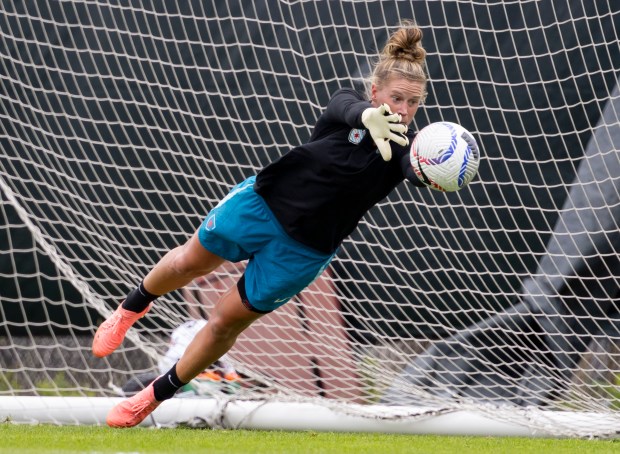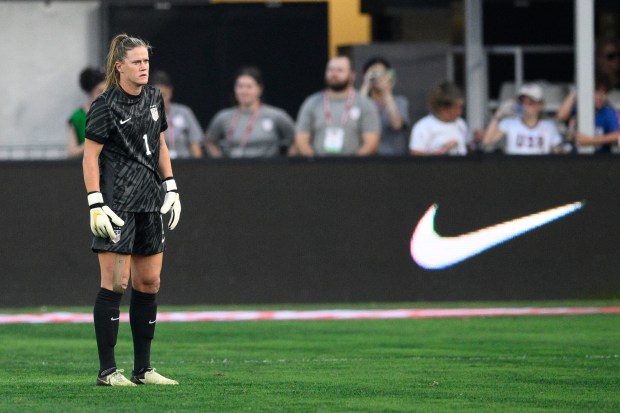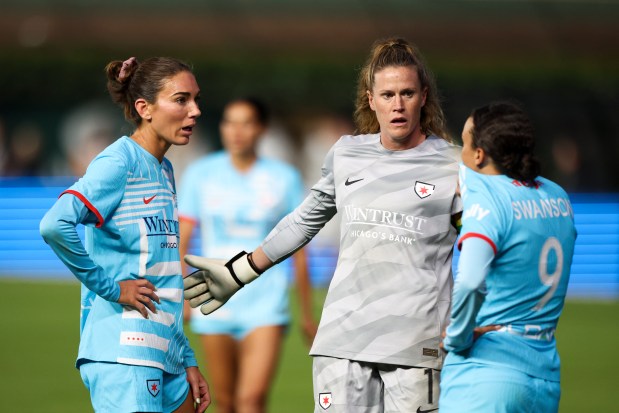Change was always inevitable for the U.S. women’s national soccer team.
Nothing can stay the same for too long. Not winning. Not losing. Over the past eight years, the U.S. learned this lesson the hard way: a quarterfinal loss in the 2016 Rio Olympics, a bronze medal five years later in Tokyo and a round-of-16 exit from the 2023 World Cup.
The Paris Olympics will be the team’s first since 2008 without Alex Morgan or Megan Rapinoe or Becky Sauerbrunn. The tournament will mark the debut for new coach Emma Hayes and will serve as a testing ground for a slew of new players.
But amid all that newness and uncertainty, one figure remains resolute and unchanged: goalkeeper Alyssa Naeher. Coaches and teammates and tournaments come and go. But on an island between the goal posts, standing firm as the last line of defense, soccer has not changed for Naeher.
“At the very core, my job is still the same: keep the ball out of the back of the net,” she said.
On a team famed for its flash, Naeher commands through her calm. During her eight years as the national team’s starting goalkeeper, she has earned the admiration and affection of teammates through her consistency.
Mallory Swanson, Naeher’s teammate on both the national team and the NWSL’s Chicago Red Stars, said most people don’t really get who Naeher is under the surface, even after nearly a decade in the spotlight. Her quiet nature isn’t shyness. It radiates an unyielding devotion to those closest to her and a drive to pursue perfection in every game.
“She’s a very, very detail-oriented person,” Swanson said. “Every detail needs to be a certain way. That’s why she’s the way she is in front of goal. If it’s one step to the left, it’s one step to the left. … I’ve always said she’s the best goalkeeper in the world and there’s a reason why.”
It has been eight years since Naeher first received an Olympic call-up, a scene she recalls in precise detail. Her parents were in town to watch her first games with the Red Stars, crowding her in the kitchen of her first Chicago apartment as the call from coach Jill Ellis lit up her phone screen.
Naeher already had earned a stable role as the national team’s No. 2 goalkeeper, backing up Hope Solo in the 2015 World Cup. It didn’t matter. Her hands still shook as she picked up the phone, waving off her mom and dad as they excitedly watched her face to discern if the news was good or bad.
“It was a surreal feeling,” Naeher said. “It was that thing where you listen extra carefully and then you hang up and you’re like, ‘Wait — she did say congratulations, right?’
“The Olympics are unique. You’re part of something even bigger. It’s such an honor.”
Despite her lengthy tenure in goal for the U.S., Naeher hasn’t competed in a normal Olympics as a starter. In 2016 she was still Solo’s backup, eager for a game in goal but understanding of her role. And after being delayed a full year by the COVID-19 pandemic, the Tokyo Olympics were anything but normal.
Nothing went right in that tournament, Naeher said, starting with the team’s final round of COVID testing the night before departure. A batch of tests malfunctioned — not uncommon at a time when athletes were testing multiple times a day to maintain strict COVID regulations — and produced six false positives. Five hours before the flight was to leave, players were desperately retaking tests, their Olympic dreams resting on the results.
Everything that followed felt foreign even to a veteran: camp extended two weeks longer than normal, complete isolation from family and friends, a lack of fans in the stands.
That’s not why the U.S. fumbled through the tournament, dropping a semifinal against Canada and settling for a win over Australia in the bronze-medal game.
But it is why this year is different. More free, more real. A return to the true Olympic experience.
“The whole thing feels different,” Naeher said. “This is a little bit more soccer-focused, sport-focused, Olympic-focused. It feels a little bit more normal.”

Since first taking over the starting goalkeeper position for the U.S. after the 2016 Olympics, Naeher’s job has remained mostly the same.
Goalkeeping has evolved somewhat — covering more ground behind the defense, contributing more to possession through the back line, operating as an 11th player rather than an add-on to the 10 field players. And Naeher has adapted her game to the needs of the team, becoming one of its most proficient penalty takers.
But for Naeher, what has changed the most is what she means to her teammates as a leader, on and off the pitch.
“She’s not going to be the loudest on the field — that’s for sure — but she’s always leading by example,” U.S. teammate Trinity Rodman said. “She leads in action and she always steps up in the best moments.”
2024 Olympics: What to know — and who to watch — during the Summer Games in Paris
That leadership is more valuable than ever for the U.S. team, which will open group-stage play Thursday against Zambia with a roster full of new faces to any fan who last watched in 2021. After years of stalling out with a veteran core, the team suddenly has become young, fielding teenagers such as Jaedyn Shaw.
And if young players do one thing, Naeher says, it’s ask questions. A lot of questions.
Naeher finds this part of her veteran stature to be grounding. She isn’t the type to offer unbidden advice, but she is eager to share. About the wins, yes, but especially about the losses.
No player grieves a loss quite like a goalkeeper. The 2019 NWSL championship game — in which the Red Stars were blown out 4-0 by the North Carolina Courage — hangs heavy on Naeher nearly five years later.
“I still to this day wish we could just restart the game and replay it,” Naeher said. “I don’t think I’ll ever get over that one.”
But those painful memories are also a road map — to a better outcome, to a title, to a gold medal. Naeher finds comfort in explaining to her young teammates what she could have done better, what the team could have done better. How they can learn from her mistakes.
So she sits for hours, offering up memories of when she fell short, picking apart every detail so that maybe this time it can all be perfect.

“Early on in your career, you have the luxury of only having to worry about yourself,” Naeher said. “Now it’s our responsibility as veteran players to be that example for some of the younger players. And that’s something that I’ve certainly had to grow into.”
In the process, Naeher is setting a standard for a new generation of the national team — one that, eventually, will play on without her.
After years of fighting for equal pay with the men’s team, exposing leaguewide abuse in the NWSL and championing the LGBT community, this team is accustomed to meaning more. But that identity of advocacy was built by players such as Rapinoe and Morgan, who now are missing from the roster.
The team already dealt with the growing pains of a fluctuating identity earlier this year, when 20-year-old midfielder Korbin Albert issued an apology and lost the privilege of wearing Rapinoe’s former No. 15 jersey after sharing and liking homophobic and transphobic posts on social media.
This part of the job isn’t easy. Naeher knows it. But this is the part of playing for the national team that carries the most weight, a legacy established in the 1980s, canonized in the 1999 World Cup and carried as a torch ever since.
”It’s important to have hard conversations sometimes and not shy away from hard conversations,” Naeher said. “That’s what helps the team grow and that’s what helps it be a representation of our country and continue to carry on the legacy of all the players that have come before us.”
Paris is not an endpoint for this new iteration of the U.S. women’s national team. It’s a beginning, a first chapter for a young group trying to prove this team is as exciting and dominant and brave as ever.
And as she strives for her first Olympic gold medal, Naeher understands the gravity of her role in molding the team’s future.
“If you want to do that right, it’s not something that gets done in one camp or even a couple months,” she said. “That’s something that takes time to cultivate. There’s so many different generations and iterations of the team that have come through since even all the way back in the ’80s.
“You see what other players have fought for in the past on this team and you want to make sure that part of that identity isn’t lost within the team. It’s a responsibility of us as players to remember the roots and remember the DNA of who we are.”



